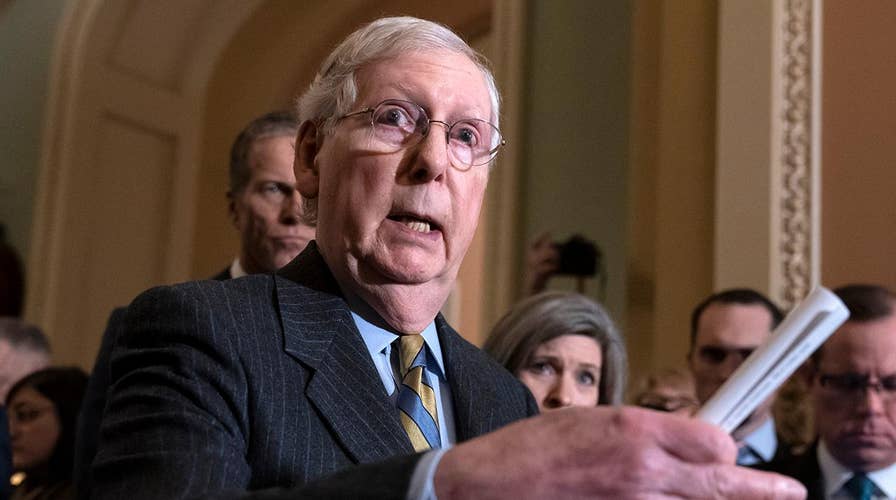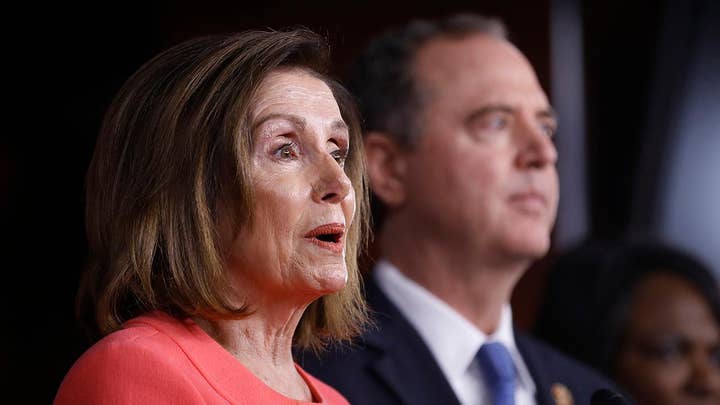Should Sen. Mitch McConnell dismiss the Democrats' impeachment case against President Trump?
Fox News confirms that Senate Majority Leader Mitch McConnell met Tuesday with Republican senators to discuss trial strategy; reaction from the 'The Ingraham Angle' legal panel: Bob Barr, former Clinton House impeachment manager, Sol Wisenberg, former deputy Whitewater independent counsel, and John Eastman, Claremont Institute senior fellow and constitutional scholar.
Media coverage of the Trump impeachment saga, like all things Trump, has been mired in partisan controversy.
Supposedly authoritative pronouncements continue to be made about the proper grounds for impeachment, the proper rules of impeachment, what constitutes a “high crime” or “misdemeanor,” the role of Supreme Court Chief Justice Roberts—you name it.
In truth, there is relatively little that can be said authoritatively and without qualification about impeachment in our constitutional system.
MCCONNELL SETS STAGE FOR IMPEACHMENT TRIAL LAUNCH, WARNS 'BOTH SIDES' COULD CALL WITNESSES
The constitutional text is sparse, only two prior presidents (Bill Clinton and Andrew Johnson) have been impeached and few other civil officers and judges have been impeached, in the nation’s entire history.
But on the off chance that there are still some folks out there who want an unbiased view about the state of the law and historical practice on impeachment as we approach the Senate trial of President Donald Trump, here are a few tentative questions and answers.
Q: Was the House’s impeachment inquiry into President Trump procedurally unconstitutional in a way that can be successfully challenged in federal court?
A: Of course not. It was rushed, somewhat unfair, and handled in a tactically inept manner. But the Constitution grants the sole power of impeaching the president to the House of Representatives.
The House ultimately authorized an impeachment inquiry, which it was not constitutionally required to do, and then passed Articles of Impeachment by a majority vote after debate.
The House that impeached Andrew Johnson in 1868 voted to do so before it even drafted Articles of Impeachment.
The House that impeached Senator William Blount in 1797 did not draw up the Articles of Impeachment until 1798.
The idea that President Trump’s impeachment could be successfully challenged on procedural grounds in a federal court is a conservative pipe dream.
But could a senator vote to acquit on the grounds that in his or her view the House process was procedurally unconstitutional or unfair? Of course. A senator can vote to acquit for virtually any reason under the sun. The Constitution grants the sole power to try impeachments to the Senate.
Q: Are the House’s articles of impeachment substantively unconstitutional because the charges are too vague or do not describe conduct that constitutes treason, bribery, or high crimes and misdemeanors?
A: President Trump is certainly free to make that claim and to try to convince the senators to acquit him on that basis. But he will not be able to successfully challenge the House’s impeachment on substantive grounds in federal court. The Constitution grants the sole power of impeachment to the House of Representatives and the sole power to try impeachments to the Senate.
The Supreme Court ruled 27 years ago in Walter Nixon v. United States that the question of what “try” means in the context of a Senate impeachment trial is a non-justiciable political question that the courts are not equipped or allowed to answer.
There is no reason to think that the Court would have a different view of the House’s power to determine in the first place what constitutes a high crime or misdemeanor, particularly given the lack of a historical or current consensus regarding the exact meaning of that phrase.
CLICK HERE TO SIGN UP FOR OUR OPINION NEWSLETTER
Would the Court intervene if the stated grounds for impeachment were patently absurd? For example, what if the House voted to impeach President Trump for the high crime and misdemeanor of having orange hair? Perhaps the Court would get involved at that point, but we are obviously nowhere near that territory today.
Q: Can a majority of Senators, without hearing any new evidence, dismiss the articles on their face for failure to state an impeachable offense?
A: Almost certainly so, under current Supreme Court case law. In Nixon, U.S. District Judge Walter Nixon was impeached by the House, and Articles of Impeachment were sent to the Senate.
The Senate, acting under Senate Rule XI, appointed a committee to receive evidence and hear testimony. That committee, after holding four days of hearings and calling 10 witnesses, sent a complete transcript and report to the full Senate.
The House Managers and Nixon then sent briefs to the full Senate and answered questions posed by Senators. The Senate voted to convict, and the Presiding Officer entered a judgment removing Nixon from office.
Nixon filed suit seeking a declaratory judgment that Senate Rule XI violated the constitutional grant of authority to the Senate to “try” all impeachments because the full Senate did not take part in the evidentiary hearings.
More from Opinion
The Supreme Court unanimously ruled against Nixon. A majority of six justices held that the meaning of “try” in the context of an impeachment trial was solely committed to the Senate by the text of the Constitution, because, among other things, the Constitution states that: “The Senate shall have the sole Power to try all Impeachments.”
The Court, therefore, refused to intervene and decide whether Nixon received a proper impeachment trial. In other words, the Court did not rule that Nixon had received an actual trial. It refused to even consider the question.
Civil and criminal charges in the state and federal courts can be dismissed for failure to state a claim or allege an offense, before testimony is taken.
The trial is over before it begins because the claim or charge does not pass muster.
So, I believe under Nixon that a successful motion to dismiss for failure to state or prove impeachable conduct would not be reviewable by the Supreme Court. But would such a dismissal be a smart thing to do? I believe the Senate would be unwise to proceed by immediately dismissing the impeachment articles for failure to state on their face an impeachable claim.
I believe at a minimum that the Senate should review all of the evidence developed in the House and engage in argument and deliberations prior to taking any vote, in order to make absolutely certain that their decision will not be subject to challenge in court. I am not making a substantive political point here as to whether the Senate should or should not hear live witnesses, including those who have not yet testified. I am talking about what the Senate should do to insulate its decision-making from subsequent judicial review.
Q: Can a majority of Senators dismiss the articles, without hearing any new evidence, because the House testimony, even if true, failed to establish an impeachable offense?
A: Again, almost certainly so, under authority of Nixon. Remember, under Nixon, the courts cannot even entertain the question of whether a dismissal in such circumstances constitutes a trial.
Civil claims and criminal charges in trial courts can be, and are, dismissed on grounds that the evidence gathered to date, even when considered in the light most favorable to the non-moving party, is insufficient to support the claim or charge.
In criminal trials, this motion is routinely made at the close of the government’s case. In the House impeachment hearings, extensive testimony has already been taken.
A dismissal under these circumstances, even if a majority of the Supreme Court reversed Nixon and proceeded to decide whether Trump had been “tried,” would pass muster.
Q: How much formal power does Chief Justice Roberts have as Presiding Officer at the Senate Impeachment Trial?
A: Not much if a majority of the Senate wants to overturn his rulings. The Constitution provides that the Chief Justice will act as the Presiding Officer in a Senate impeachment trial of the president.
The Constitution does not define, however, what power the Presiding Officer has.
Turning to historical precedents, both at the time of the Constitution’s creation and during the two presidential impeachment trials the Senate has conducted, it is fairly clear that the Chief Justice alone cannot overrule a majority of Senators on any substantive or procedural trial-related issue.
Under current Senate impeachment rules, the Presiding Officer decides all evidentiary questions including relevancy, materiality, and redundancy of evidence, but his rulings can be overturned by a simple majority vote or he can submit such questions to the Senate in the first instance.
The notion currently floating around in some circles that Chief Justice Roberts is in full control of the Senate trial on substantive Constitutional issues is a liberal pipe dream.
This is a different question than whether a particular ruling by Roberts will be seen as having such moral or legal force that a majority of Senators will find it politically dangerous to overturn.
It is also a different question than whether Senators will use some or all of Roberts’s rulings as political cover.
As Hamilton tells us in the Federalist Papers, impeachments are inherently political in nature.
Of course, there is no absolutely right or wrong answer to many of the questions that may arise in an Impeachment trial. For example, what if former Trump National Security Adviser John Bolton is called to testify but President Trump invokes Executive Privilege or presidential immunity to prevent his appearance or testimony?
Can Chief Justice Roberts decide to rule on that issue as an initial matter, because it relates to the admissibility of evidence?
If he rejects the claim of Executive Privilege and a majority of the Senate sustains his ruling, can the president seek a declaratory judgment on his Executive Privilege claim in federal court?
If so, will the Supreme Court expedite review and decline to intervene citing the political question doctrine?
The answers to quite a few of these impeachment-related questions are too difficult to predict with any certainty.
CLICK HERE TO GET THE FOX NEWS APP
As former Supreme Court Justice Oliver Wendell Holmes famously said, “a page of history is worth a volume of logic.”
Get ready. We are about to turn another critically important page in our nation’s constitutional history.












































